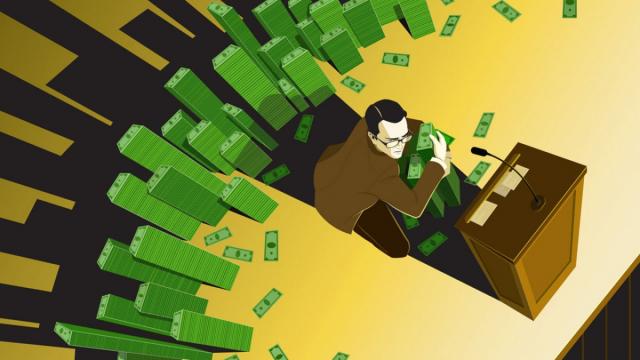
Inequality doesn’t cause every problem in our world today. Inequality just makes every problem worse.
Big problems especially. Like recessions.
We’ve known for some time that recessions — and depressions — become much more likely when wealth starts excessively concentrating in the pockets of the already rich.
Now we have important new research that adds to this story. The same inequality that gets us into economic messes turns out to significantly slow the clean-up.
The research comes from an international team of economists who’ve just examined how Americans at different levels of wealth behaved economically before and during the Great Recession. What did American households spend, the investigators asked, and what did they save?
The researchers — the University of Pennsylvania’s Dirk Krueger, the University of Stockholm’s Kurt Mitman, and Federal Reserve Bank of Minneapolis analyst Fabrizio Perri — essentially found what they expected for the period right before the Great Recession. The lower a household’s net worth in 2006, their work shows, the higher that household’s consumption rate.
On this front, no surprise. Poorer households typically spend a higher share of their incomes than richer families. The goods and services their families need just to get by on a daily basis grab most all of their incomes.
Richer households, on the other hand, spend far more total dollars on goods and services than poorer families. But they also make far more. With their pockets overflowing, they can afford to save a substantial share of their incomes.
This dynamic becomes more pronounced in any economy growing more unequal. The wealthier the rich become, the more they save. That’s all to the good, the pals of plutocrats insist. Savings by the rich, they assure us, create prosperity as the rich invest in businesses that create jobs. Everybody wins!
In real life, rising inequality limits most all winning to the wealthy. Those savings that rich people have to invest don’t go to businesses that create good jobs because average people — in an economy that’s concentrating rewards at the top — can’t afford to be good customers.
With job-creating businesses struggling, the rich take their savings elsewhere. They speculate. Enter our bubble economy. The huge downside to all this: All bubbles eventually pop. The great housing bubble of the early 21st century would pop into 2008’s Great Recession.
So what happened then with the consumption and savings patterns of America’s households? Here’s where the new research from economists Krueger, Mitman, and Perri gets particularly interesting. The trio found a striking “change in consumption expenditures at different points in the wealth distribution” after the Great Recession hit.
Between 2006 and 2010, their research shows, saving rates increased most strongly “at the bottom of the wealth distribution.” How could less affluent households suddenly afford to save more? During the Great Recession, they cut their consumption at twice the rate of more affluent households.
And that behavior made eminent sense. These less affluent households — essentially the poorest 40 percent of Americans — held less than 1 percent of the nation’s wealth going into the Great Recession. In 2008, with people losing jobs left and right, these households cut back their spending markedly and started “to save massively” to protect themselves from the shock of job loss.
But what makes sense for particular households, researchers Krueger, Mitman, and Perri make plain, didn’t make sense for the economy as a whole. With the nation’s less affluent spending less, businesses cut back more, and the nation’s economic mess just became messier. The recovery sputtered.
Unemployment insurance, in an ideal world, prevents this sort of downward spiral. Unemployment benefits give families at the economic edge a modicum of security. Households that can count on these benefits to cushion the shock of job loss will continue to consume. Their consumption, in turn, helps a troubled economy recover.
Unemployment insurance in our contemporary United States, unfortunately, remains too spotty to offer any appreciable real security. In the Great Recession, less affluent households felt — with considerable justification — on their own.
If poorer Americans had had unemployment benefit security at the depth of the Great Recession — and, more importantly, if poorer Americans had had a larger share of the nation’s wealth — the nation would have consumed more after the Great Recession hit. The recovery would have been more robust.
Without wealth inequality, as economist Dirk Krueger told one interviewer earlier this month, we still would have had a drop-off in overall consumption during the Great Recession. But that drop “would not have been as large” — and America’s worst economic downturn since the Great Depression would not have lasted as long and been as hard.
Still another good reason, as if we need one more, to make America more equal.
3 WAYS TO SHOW YOUR SUPPORT
- Log in to post comments














Comments
marrythomas824 replied on
My Uncle Jason got a new
My Uncle Jason got a new yellow over S10 linked here
++++++++++ NewsCash50.TK